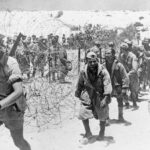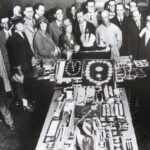What were Zhukov’s thoughts on old (monarchist) Russia? Georgy Zhukov, the famed Soviet general of World War II, is a complex figure whose views on monarchist Russia and communism were shaped by both personal experiences and the broader historical context of his life. Here’s a breakdown:
Thoughts on Old (Monarchist) Russia
Rural Origins and Harsh Reality:
Zhukov was born in 1896 into a peasant family in Kaluga Province during the Russian Empire. His early life was marked by poverty, a condition common among Russian peasants under the monarchy. This experience likely contributed to a critical view of the old regime, as it offered little opportunity for social mobility or relief from hardship.
Military Career Under the Tsar:
Zhukov joined the Imperial Russian Army during World War I, where he displayed bravery and leadership, earning distinctions like the Cross of St. George. His exposure to the hierarchical and often brutal nature of the old military system may have reinforced a pragmatic rather than nostalgic view of Tsarist Russia.
Impact of the Revolution:
The collapse of the monarchy during the Russian Revolution of 1917 opened new paths for people like Zhukov, who would not have advanced far under the old regime. His subsequent career flourished under the Bolshevik system, which provided opportunities based on merit and loyalty to the Communist Party.
Communist Convictions vs. Circumstance
Pragmatism Over Ideology:
While Zhukov outwardly expressed loyalty to the Communist Party, his actions and demeanor suggest he may not have been a staunch ideologue. He was a professional soldier, focused primarily on military efficiency and effectiveness rather than promoting Marxist-Leninist principles.
Survival and Success in Stalin’s USSR:
To rise to the rank of Marshal of the Soviet Union, Zhukov had to navigate the treacherous political waters of Stalin’s regime. This required at least outward conformity to communist ideals and participation in the system. However, his clashes with Stalin after the war, especially over his growing popularity and independent streak, indicate he was not a wholehearted supporter of the totalitarian aspects of the regime.
Relationship with the Soviet System:
Zhukov benefited immensely from the Soviet military-industrial complex, which allowed him to command vast resources and wield considerable power. Nevertheless, his postwar marginalization and the periods of political persecution he endured suggest he may have viewed the system as a double-edged sword.
Summary
Zhukov’s views on old Russia were likely shaped by a combination of disdain for the inequities of Tsarist society and appreciation for the opportunities the Soviet system afforded him. However, his relationship with communism appears to have been more practical than ideological. While he was a product of his time and circumstances, his loyalty was ultimately to the military and the defense of his country, rather than to any specific political doctrine.


